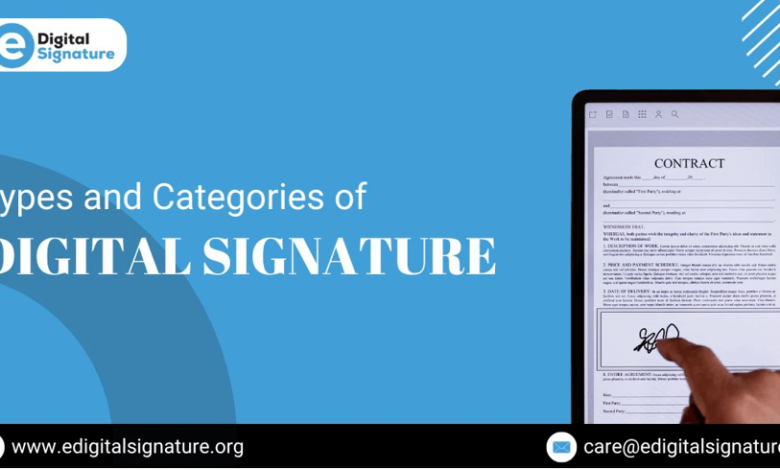Types and Categories of Digital Signatures

In the digital age, securing communications and verifying identities online is paramount. Digital signatures, which are the digital counterparts of handwritten signatures or stamped seals, provide a way to ensure the authenticity, integrity, and non-repudiation of digital messages and documents. There are three primary classes of digital signatures, simple, basic, and advanced. Each class offers different levels of security and verification, tailored to varying needs and applications.
Simple Digital Signatures
Simple digital signatures are the most basic form of electronic signature. They include any electronic method that signifies agreement to a document or transaction. Examples include scanned handwritten signatures, a typed name at the end of an email, or clicking an “I Agree” button on a website.
Characteristics
- Ease of Use: Simple digital signatures are easy to create and use, often requiring no specialized software or hardware.
- Low Security: They offer minimal security and are susceptible to forgery, tampering, and misuse.
- Legal Recognition: While they may be legally recognized in some jurisdictions and for certain types of agreements, their validity can be easily challenged due to the low level of security they provide.
Applications
- Low-Risk Transactions: Ideal for low-risk, informal agreements such as internal memos, routine acknowledgments, or consumer transactions where the risk of fraud is minimal.
- Convenience: They provide a quick and straightforward method for sign-offs where high security is not a priority.
Basic Digital Signatures
Basic digital signatures represent a step up in security from simple digital signatures. They are created using standard cryptographic techniques that link the signature to the signer and the document in a more secure manner.
Characteristics
- Cryptographic Techniques: Basic digital signatures utilize algorithms such as RSA or DSA to create a unique digital fingerprint of the document.
- Moderate Security: They offer a moderate level of security, ensuring that the document has not been altered since it was signed and that the signature is authentic.
- Verifiability: The use of cryptographic keys enables verification of the signer’s identity and the integrity of the signed document.
Applications
- Business Transactions: Suitable for business agreements, purchase orders, and other transactions that require a moderate level of security.
- Regulatory Compliance: Used in industries where regulations require a higher level of security than what simple signatures can provide.
Advanced Digital Signatures
Advanced digital signatures provide the highest level of security and are often legally equivalent to handwritten signatures in many jurisdictions. They involve the use of a digital certificate issued by a trusted Certificate Authority (CA), which verifies the signer’s identity.
Characteristics
High Security: These signatures use public key infrastructure (PKI) to provide a high level of security, ensuring that the signature is linked uniquely to the signer and is capable of identifying the signer.
Tamper-Evident: Any alteration to the signed document renders the signature invalid, providing strong protection against forgery and tampering.
Legally Binding: Recognized in many jurisdictions as legally binding, often meeting stringent regulatory and compliance standards.
Applications
- High-Value Transactions: Used in high-value transactions, legal documents, and contracts where the highest level of security and authenticity is required.
- Regulated Industries: Common in industries such as finance, healthcare, and government, where data security and integrity are paramount.
Read also: The Future of Passport Registration: Emerging Technologies and Trends
Classes of Digital Signature Certificate (DSC)
Digital Signature Certificates (DSCs) are a crucial component of secure digital transactions, ensuring authenticity and integrity. They come in different classes, each offering varying levels of security and validation. Here are the common classes of Digital Signature Certificates:
Class 1 DSC:
Class 1 DSCs are issued for individuals and are primarily used for email communication.
These certificates validate the identity of the individual against a pre-verified database.
They provide a basic level of assurance regarding the identity of the sender.
Class 2 DSC:
Class 2 DSCs are issued for both individuals and entities.
They offer a higher level of security compared to Class 1 certificates.
To obtain a Class 2 certificate, the applicant’s identity is verified against a trusted government database.
Class 3 DSC:
Class 3 DSCs are the most secure among the three classes.
They are issued after stringent verification processes, including in-person identity verification.
Class 3 certificates are typically used in high-value or legally sensitive transactions, such as e-tendering, e-auctions, and e-procurement.
DGFT DSC:
DGFT (Directorate General of Foreign Trade) DSCs are specialized certificates used for digital transactions related to foreign trade.
They are issued exclusively by the DGFT and are mandatory for specific online transactions with the DGFT portal.
Also Read, Class3-Dsc-for-etender.
Conclusion
Digital signatures play a crucial role in the digital economy by ensuring the authenticity, integrity, and non-repudiation of electronic documents and transactions. Understanding the three classes of digital signatures—simple, basic, and advanced—helps individuals and organizations choose the appropriate level of security for their specific needs. Simple digital signatures offer convenience for low-risk transactions, basic digital signatures provide a moderate level of security suitable for most business transactions, and advanced digital signatures offer the highest level of security and are often required for legally binding agreements and high-stakes transactions.
Each class of Digital Signature Certificate serves different purposes and offers varying levels of security and trust. Choosing the right class of DSC depends on the intended usage and the level of assurance required for the digital transaction.






